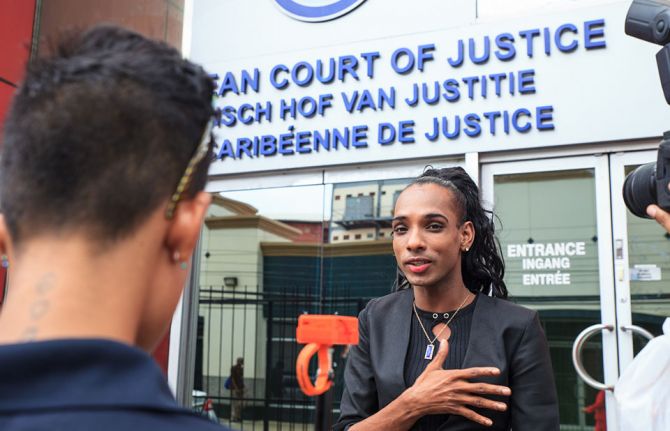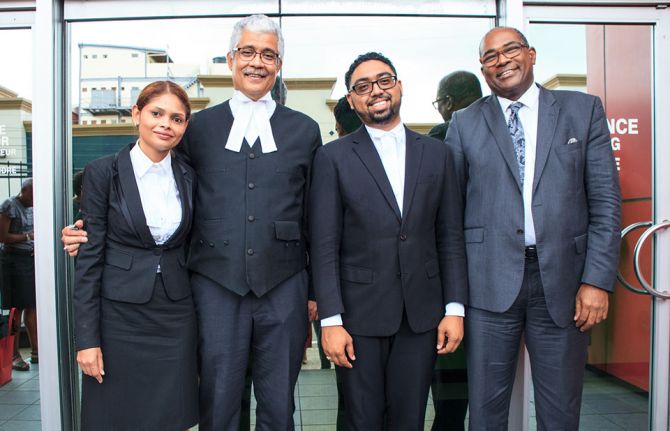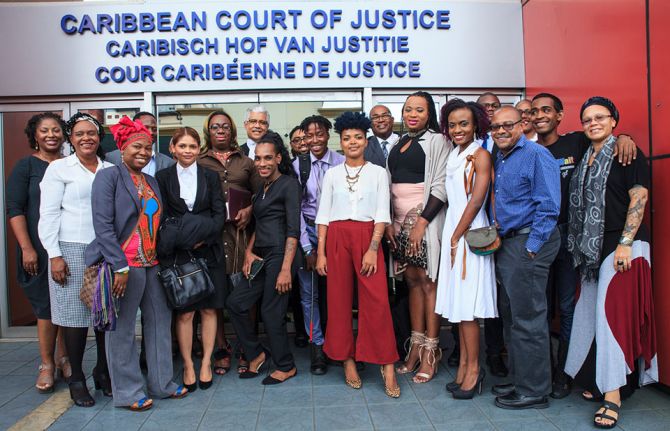



Feature Story
How discriminatory Caribbean laws are being challenged in the courts
01 March 2019
01 March 2019 01 March 2019On the night of 6 February 2009 in Georgetown, Guyana, seven transgender women were rounded up by the police and detained for the weekend. The following Monday, in the Georgetown Magistrates Court, they learned that they had been charged with cross-dressing. They pleaded guilty, were convicted and were each ordered to pay a fine. But not before being admonished by the Magistrate that they were “confused about their sexuality.”
With support from the Faculty of Law University of the West Indies Rights Advocacy Project, U-RAP, the group challenged the nineteenth century Guyanese law that bars men from dressing like women, and women from dressing like men “for an improper purpose”. On 13 November 2018, Guyana’s final court of appeal, the Caribbean Court of Justice (CCJ), ruled unanimously that the law violates the Constitution of Guyana and is therefore void.
“No one should have his or her dignity trampled on, or human rights denied, merely on account of a difference,” CCJ President, Adrian Saunders, said.
For U-RAP Co-Coordinator and law lecturer Tracy Robinson, this was a step towards addressing the unequal power and unequal life chances of many Caribbean people.
"Laws do not apply evenly to everyone: those with the least resources and those marginalized are at greatest risk. Trans women are not the only ones who face lives which are cut short by state action and state inaction. There are many other instances in which we leave out and exclude those who are integral and part of our societies,” Ms Robinson said.
HIV is one manifestation of the way vulnerable communities are left behind. In the region, HIV prevalence among key populations is much higher than among adults generally. For example, among transgender women in Guyana—one of the few Caribbean countries with data on this population—the HIV prevalence is 8.4%, compared with 1.7% among all adults. Relevant Caribbean data indicate that HIV prevalence among gay men and other men who have sex with men ranges between 1.3% and 32.8%. The combination of discriminatory laws, stigma and discrimination and the relative lack of friendly services for members of key populations drives people underground, blocking them from HIV prevention and treatment services.
But in some countries, partners are acting to challenge the constitutionality of discriminatory laws held over from the colonial era. Through a case also supported by U-RAP, Caleb Orozco challenged the law in Belize that made “carnal intercourse against the order of nature,” which includes anal sex, a crime punishable by up to 10 years imprisonment. On 10 August 2016, Belize became just the second independent Commonwealth Caribbean country to decriminalize sex between men, and the first to do so through its courts.
And in Trinidad and Tobago the High Court ruled in favour of Jason Jones on 12 April 2018, finding that sexual activity between consenting adults should not be criminalized. This ruling was cited in the landmark Indian Supreme Court decision in 2018 decriminalizing gay sex.
UNAIDS is contributing to community engagement and communication around these issues, including supporting public forums in Belize and Trinidad and Tobago and the sensitization of journalists reporting on the transgender community in Guyana.
For the litigants, these victories are one step forward in a long journey towards equity.
“It forces communication between families and their lesbian, gay, bisexual and transgender relatives. It encourages people who are lesbian, gay, bisexual or transgender to come out the closet. It forces institutions to think about their administrative practices and the discrimination they justified based on that law. It forces homophobic people to acknowledge that the constitution covers everyone,” Mr Orozco said.
Litigant and co-founder of Guyana Trans United, Gulliver Quincy McEwan, said “It was very important for us to be heard and get justice.”



